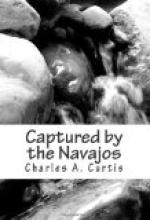“And certainly,” added Frank, “we have gained nothing in distance in crossing. The march is to be short to-morrow.”
“Still, boys, there is quite as good a reason for doing this as for starting early to avoid the heat of the day. These Far Western streams have a trick of rising suddenly; very rarely, to be sure, but frequently enough to cause commanding officers to be on their guard. A rainfall fifty or seventy-five miles up-stream might send down a volume of water that would make it impassable for several hours or several days, according as the fall is large or small; so the rule in the army is, ‘cross a stream before camping.’”
“Have you ever been caught by a rise, sir?”
“Twice. Once on this very stream, near its mouth. I was in command of a small escort to a train. The wagon-master advised me to cross, but I was tempted by a fine meadow on the lower side, in contrast to a rough place on the opposite side, to take my chances. I was compelled to remain there five days. The other delay was on the Gallina; but that was rising when we approached and we had no choice about crossing. We were delayed that time but two days.”
“I heard the paymaster and surgeon grumbling about the folly of crossing just now,” said Frank.
“Very likely; this is their first march in the Far West.”
“The captain and lieutenants heard them, but did not explain, as you have. Why was that?”
“There are two reasons. One is that in the army, as well as out of it, ‘tenderfeet’ are left to learn by experience; the other is that our surgeon resents being cautioned or advised. Now, boys, after dinner you had better take a siesta. By doing so you will find it less difficult to make an early start to-morrow morning.”
“Thank you,” replied Frank. “Tom Clary and George Hoey have told us that a nap is the correct thing after dinner on the march. Henry and I are going to try it.”
“I am sorry, sir,” added Henry, “that I was so ill-humored this morning. I will try to do as the soldiers do when they first start out—say nothing till day breaks.”
“The early start was a surprise to you; you will be prepared for it hereafter.”
A reverberating peal of thunder interrupted our conversation and caused us to glance towards the west. There we saw a mass of dark clouds rolling down upon us. Bolt after bolt of lightning zigzagged across the sky and from sky to earth, and peal after peal of thunder crashed upon our ears.
VII
A SWOLLEN STREAM AND STOLEN PONY
It was our custom at all camps to park the supply-train in the form of an oval, with the tongues of the wagons outward and the wheels locked. An entrance, the width of a wagon, was left at one end.
When, therefore, it became certain that a tempest was about to break upon us, using the boy corporals as messengers, the chief wagon-master received orders from me to drive up the mules and corral them within the circle of wagons, and the commissary stock was hurried under the shelter of a rocky mesa west of the camp. All this was to prevent a stampede should the coming tempest be accompanied by wind and hail.




